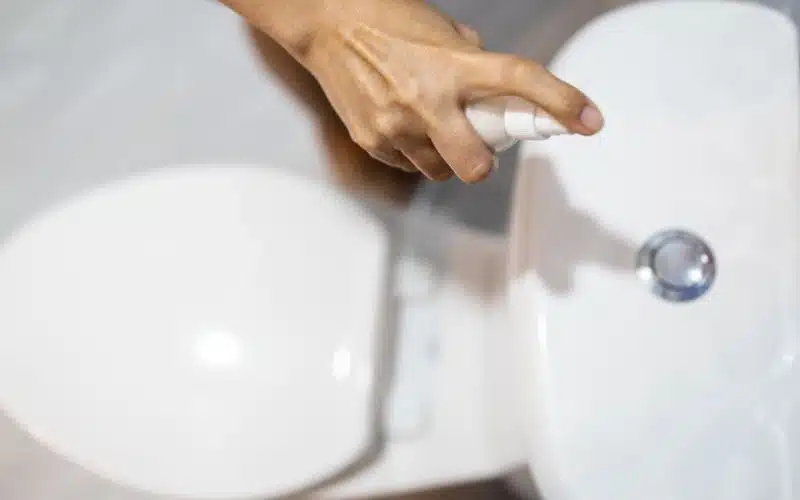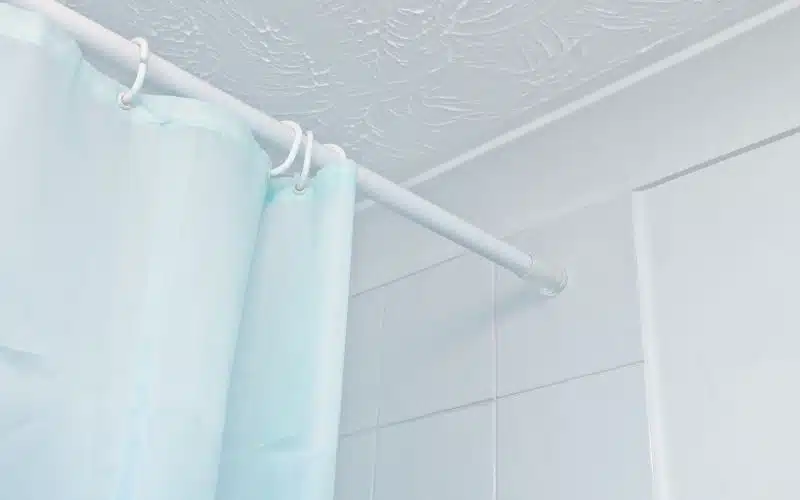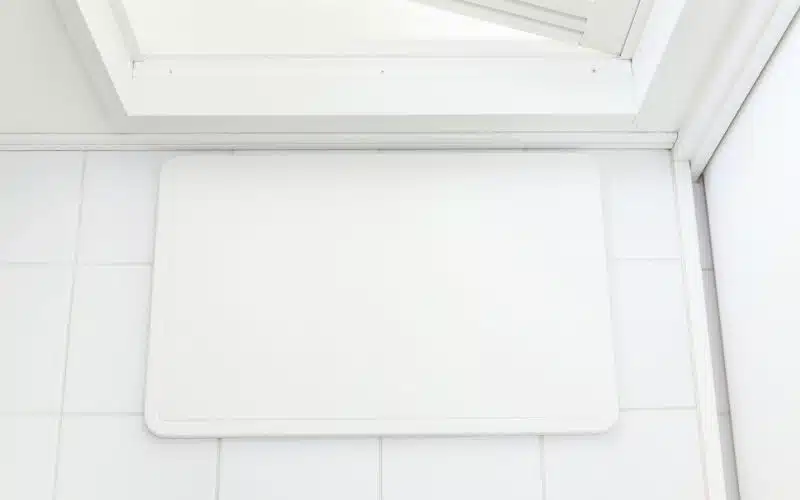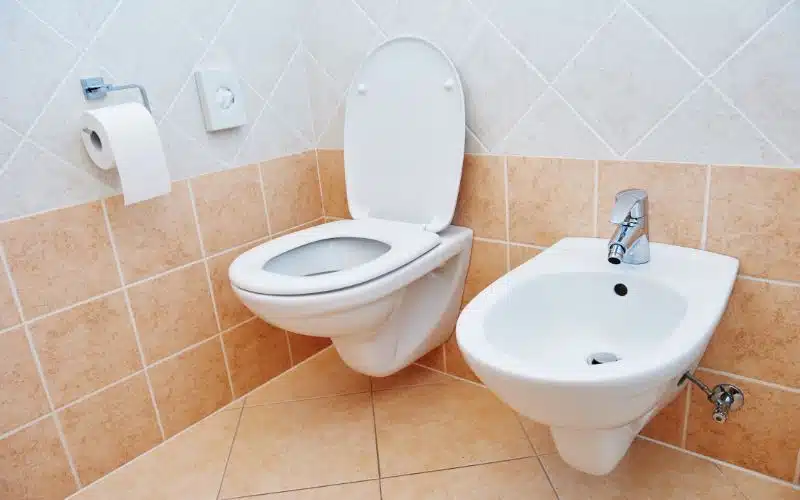Shower curtains are special coverings that control water and improve your privacy while showering.
Furthermore, shower curtains may contain vinyl, polyester, cotton, or microfibre. For this reason, you’d have different thoughts about whether to dispose of old curtains or keep them.
It would be best if you didn’t throw away shower curtains; you should find a way to reuse them in your home. Many of these coverings comprise PVC or polyvinyl chloride. Unfortunately, vinyl products are not biodegradable, and they are not easily recycled too.
What Can I Do With My Old Shower Curtain?
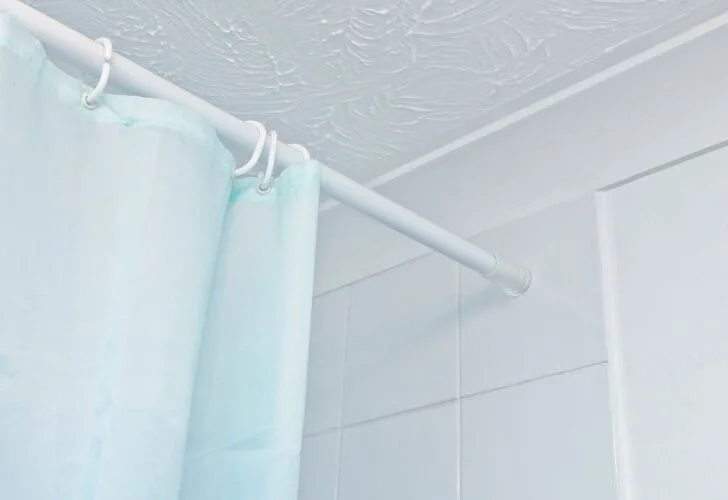
Your curtains are useful outside if you no longer need them in the bathroom. Here are some ideas to upcycle your shower curtains into something new!
#1. As Apron for Dirty Chores
Home chores like sanitizing the toilet and gardening usually require a heavy-duty apron.
You can turn the old shower curtain into an apron to protect yourself from dirt and spills while cleaning. In addition, the kids can wear the apron to protect themselves while playing with colors.
#2. Dinner Table Dish Mats
This upcycling process doesn’t require much work, and it’s easy, like cutting papers with scissors.
If you’re looking for a simple, productive project, try making dinner place mats out of shower curtains.
Dinner mats would make cleaning effortless for you, especially when made from moisture-resistant curtains.
#3. Weatherproof for Stuff
You can use an old shower curtain to protect your property from water. For instance, you can design a curtain to secure your patio pillows from rain.
In the same way, you can make a curtain to cover your outdoor chairs too. Also, you can keep the stacked firewood outside safe from rain or snow using an old shower curtain.
#4. Protection of Car Seats
You can upcycle shower Curtains to keep your car seat safe when your kids have drinks in their hands.
Furthermore, you can use plastic curtains to shield your vehicle’s seat when there’s a dog around.
#5. Picnic Mat
Was there recent rain? No problem! It would help if you took the vinyl shower curtain instead of the usual blanket when going for a picnic.
The water-resistant curtain would keep you drier than a simple blanket.
#6. Shower Curtain Are Great For Dog Bed Cover
It is a fact that dog bed covers are challenging to clean. It’s not easy removing the furs on the bed case.
However, cleaning would be less stressful when you use the smooth bathroom curtain as the dog’s new bed cover.
How Often Should You Get a New Shower Curtain?
A rule of thumb is you change your shower curtain every six months. Notwithstanding, you should often check and wash your shower curtain for a longer usage time.
However, if your curtain has mildew that never seems to scrub out completely, it’s time to replace it.
Also, whether you use a shower liner to protect the curtain determines its durability. It’s even possible to replace a shower curtain only once a year.
But, this stipulated time frame could depend more or less on bathroom conditions and the curtain’s quality.
Furthermore, a curtain lasts longer if you use a shower liner to protect it. The plastic liner goes inside the tub, shielding the decorative curtain from water.
However, you should clean the plastic liner monthly because it directly interacts with water and scum.
Equally important, frequently wash your fabric curtains because absorbent materials are more prone to mold and mildew than plastic.
Besides, shower curtains harbor more bacteria than your toilet seat. That is because the shower curtain gets wet daily and retains moisture longer than toilet seats.
Therefore, if you wash the plastic liner and shower curtain frequently, you’d only replace your curtain once a year.
Can Plastic Shower Curtains Be Washed?
You can wash your plastic shower curtain. Additionally, you can choose to wash the vinyl curtain using a machine or hand wash. I’ll take you through both processes.
#1. Washing Machine
When washing your shower curtain in the washer, it is best to use warm water. Furthermore, add a half cup of color-safe bleach, vinegar, baking soda, or laundry detergent to your washing cycle.
Remember that you’re to use only one of the above cleaners. Doing otherwise could cause a reaction that can damage your plastic curtain.
Nevertheless, you’re to use bleach if you are specifically looking to treat mold spots or remove mildew. Before starting the washing machine, add a bath towel or two.
The bath towels would help prevent the curtain from wrinkles and aid in scrubbing for a good wash.
After the laundry, ensure to hang the plastic curtain to dry. Always air dry your plastic shower curtains; they should never go into the dryer.
#2. Hand Washing
You can use your hands to wash your plastic shower curtain using a soft cloth and baking soda. First, lightly wet the cloth and sprinkle some baking soda.
Then, use the mixture to scrub all areas of the shower curtain and rinse with warm water when you’re done.
Are Shower Curtain Liners Recyclable?
While most shower curtains aren’t recyclable, some can be recycled. This variation is because curtain liners comprise different textures and materials.
Thus, the recyclability status of shower curtain liners depends on the material used in their production.
Generally, PVC-based materials are almost impossible to recycle, and you should think twice before purchasing them.
For this reason, when buying a liner, you should focus on beauty and the material. This early planning would aid you in deciding easily at the store.
In addition, PVC contains many toxins that can escape into the environment while heating it during recycling.
Aside from that, bathroom substances that may have come in contact with the liners can also contaminate the recycling process. However, TerraCycle can recycle almost any plastic.
For this reason, the Company accepts shower curtains for recycling in their Bathroom Accessories Zero Waste Box.
You simply mail a box to them containing the old shower curtains, and they will take it from there.
Nevertheless, this solution is expensive, it costs about $118, but this amount is not only for the curtain liner.
You can also include hard-to-recycle products like bath toys, soap dispensers, bath mats, and more in the box.
How Do I Keep My Shower Curtain From Molding?
If you’re careless, mold will appear on your shower curtains someday. But, you can prevent the growth of this fungus from happening on your curtain. Don’t wait until you start seeing signs because that situation might be too late.
Here are some ways to keep your Shower curtains from molding;
- Wash the shower curtain regularly.
- Use a shower liner to protect your shower curtains from water while showering.
- Shake the shower Curtain after each use to allow it to dry quickly.
- Ventilate the bathroom to allow humid air escape after a shower.
- Spray your shower curtain with white distilled vinegar after a shower. This action helps to kill any mold or mildew buildups.
Which Is Better, Fabric or Vinyl Shower Curtains?
Both shower coverings have their good and bad sides. But, to tell which of these curtains is suitable for your bathroom depends on you!
#1. Fabric Shower Curtains
If you’re conscious of your environment, fabric shower curtains should be the first option for your bathroom.
But you’d not be correct to think fabric shower curtains are perfect. That is because cloth curtains are more prone to mildew and mold than plastic curtains.
That said, let’s look at the ups and downs of fabric curtains.
| Pros | Cons |
|---|---|
| They’re easy to clean. | They’re more expensive than plastic. |
| They make less Noise. | They’re quicker to harbor mildew and mold. |
| They come in a variety of designs. | They require frequent washing. |
#2. Vinyl Shower Curtains
Vinyl shower curtains are a popular option because they cost less than fabric curtains. These curtains are light, but you can’t simply toss them into a washer like the cloth alternative.
Similar to fabric curtains, vinyl curtains are available in different designs and colors.
Here are the benefits and shortcomings of vinyl curtains.
| Pros | Cons |
|---|---|
| They’re cheaper than fabric curtains. | They make squeaky noises. |
| They require low maintenance. | They’re not eco-friendly. |
| They’re water-resistant coverings. | They’re difficult to mend when torn. |
Conclusion
Generally, it would help if you didn’t throw away shower curtains made of PVC, cotton, linen, or polyester.
They are all reusable at home in their special way if properly crafted. Nonetheless, you should never carelessly dispose of the PVC shower curtain because it is non-biodegradable.
